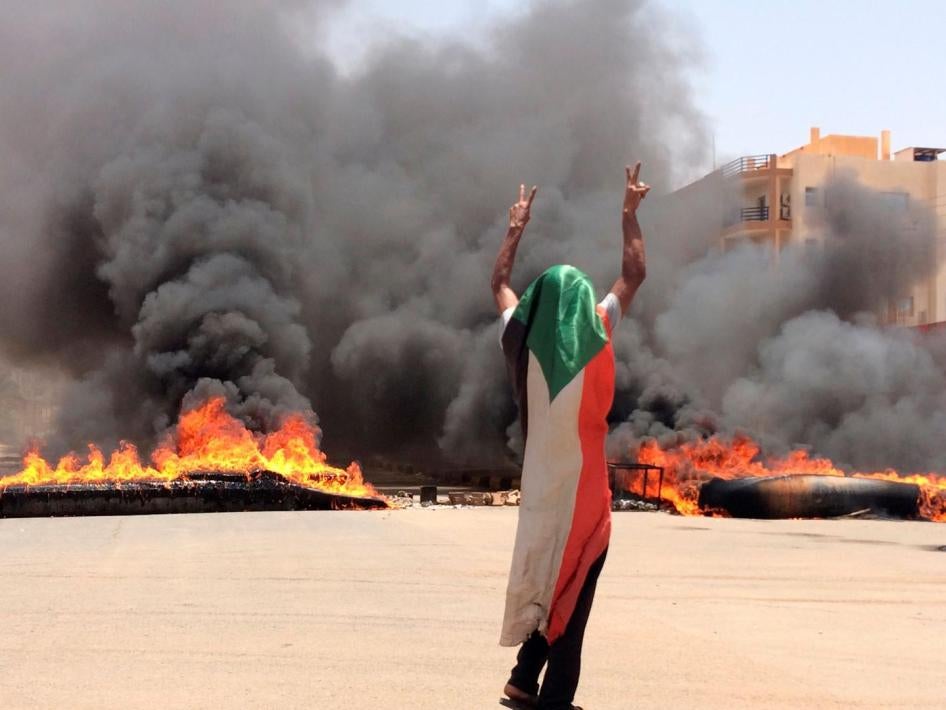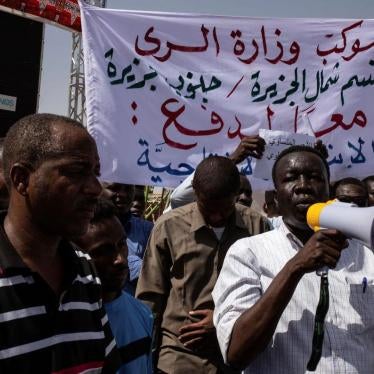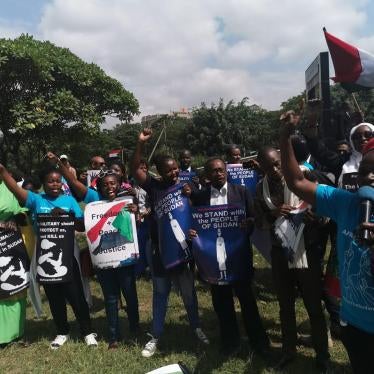Sudanese leaders should facilitate the establishment and cooperate with the work of an effective international investigation into the killings of and abuses against protesters since December 2018, Human Rights Watch said today.
On July 5, 2019, a coalition of opposition groups and the Transitional Military Council, which took power on April 11 when former president Omar al-Bashir was ousted from power, signed a power-sharing deal that paves the way for a transitional government.
“With hundreds killed and many more injured, the Sudanese people are entitled to demand answers and justice,” said Jehanne Henry, associate Africa director at Human Rights Watch. “A credible, independent investigation into all the horrific abuses against protesters over the past six months needs to be a priority for Sudan’s new leaders.”
Under the July 5 deal, a new sovereign council consisting of five military representatives, five civilians, and another civilian agreed upon by both parties will share power for a transitional period of just over three years. A military commander is to hold the presidency for the first 21 months, followed by a civilian for 18 months, followed by elections.
Protests in Sudan started in December, calling for the fall of al-Bashir, who was president for almost 30 years and who is wanted by the International Criminal Court for atrocities in Darfur. Local groups monitoring casualties, including the opposition doctors’ union, estimated that over 100 people were killed during the protest period up to the time when al-Bashir was ousted.
Since the military council’s April takeover, the Rapid Support Forces have risen to prominence and participated in or led most crackdowns on protesters. The unit is commanded by the military council’s deputy, Mohamed Hamdan Dagalo – “Hemeti” – who is known for his unit’s abuses in Darfur, Southern Kordofan, and Blue Nile.
In June alone, government forces including the Rapid Support Forces killed over 130 protesters. The single deadliest day was June 3, when government forces led by RSF opened fire on protesters and burned down their sit-in camp. Video evidence shows the heavy deployment of security forces using heavy gunfire, and many victims of gunshot wounds. Local monitors reported that 128 people were killed in that attack. Witnesses, including many victims, provided to Human Rights Watch accounts of soldiers arbitrarily arresting and beating protesters. Local monitors reported that troops raped many protesters or threatened them with rape.
On June 30, when tens of thousands of Sudanese marched calling for a transition to civilian rule, government forces again used deadly force to break up protests. Witnesses told Human Rights Watch that Rapid Support Forces soldiers shot at them as they crossed a bridge. “We lay on the ground and I could see people were shot and being carried to a nearby hospital,” recalled one 29-year-old protester.
Video evidence from that day shows security forces opening fire on and beating peaceful protesters as well as attacking patients and health workers at a hospital in Khartoum. Local monitors said that at least 11 people were killed, including 3 young men whose slain bodies were found by residents on a street in Omdurman following the protests.
Military council officials have previously promised to investigate violence against protesters. On June 21, Hemeti announced the arrest of several soldiers he called infiltrators who are accused of attacking protesters on June 3, but he did not reveal their identities, as the military investigations are ongoing. On June 29, an official leading a governmental commission of inquiry urged members of the public to come forward between July 6 and 10 to provide their accounts of abuses.
The July 5 power sharing deal also includes an investigation into the violence, including on June 3, media reported. Any investigation should include all abuses against protesters since December, when the government began attacking protesters, Human Rights Watch said.
Previous government investigations into protester killings in September 2013, when security forces killed more than 170 people, most in Khartoum, have not led to justice for the victims. Given Sudan’s poor record on accountability for human rights abuses across the country, its leaders should cooperate with international and regional entities to assist in any efforts toward accountability, Human Rights Watch said.
“Sudan’s leaders should show they are serious about justice by facilitating an international, independent investigation to assess the full scale of abuses and identify those responsible,” Henry said. “Sudan should cooperate with the UN’s Human Rights Council, currently in session, and with the African Commission on Human and People’s Rights to ensure that credible investigations are carried out as soon as possible.”









